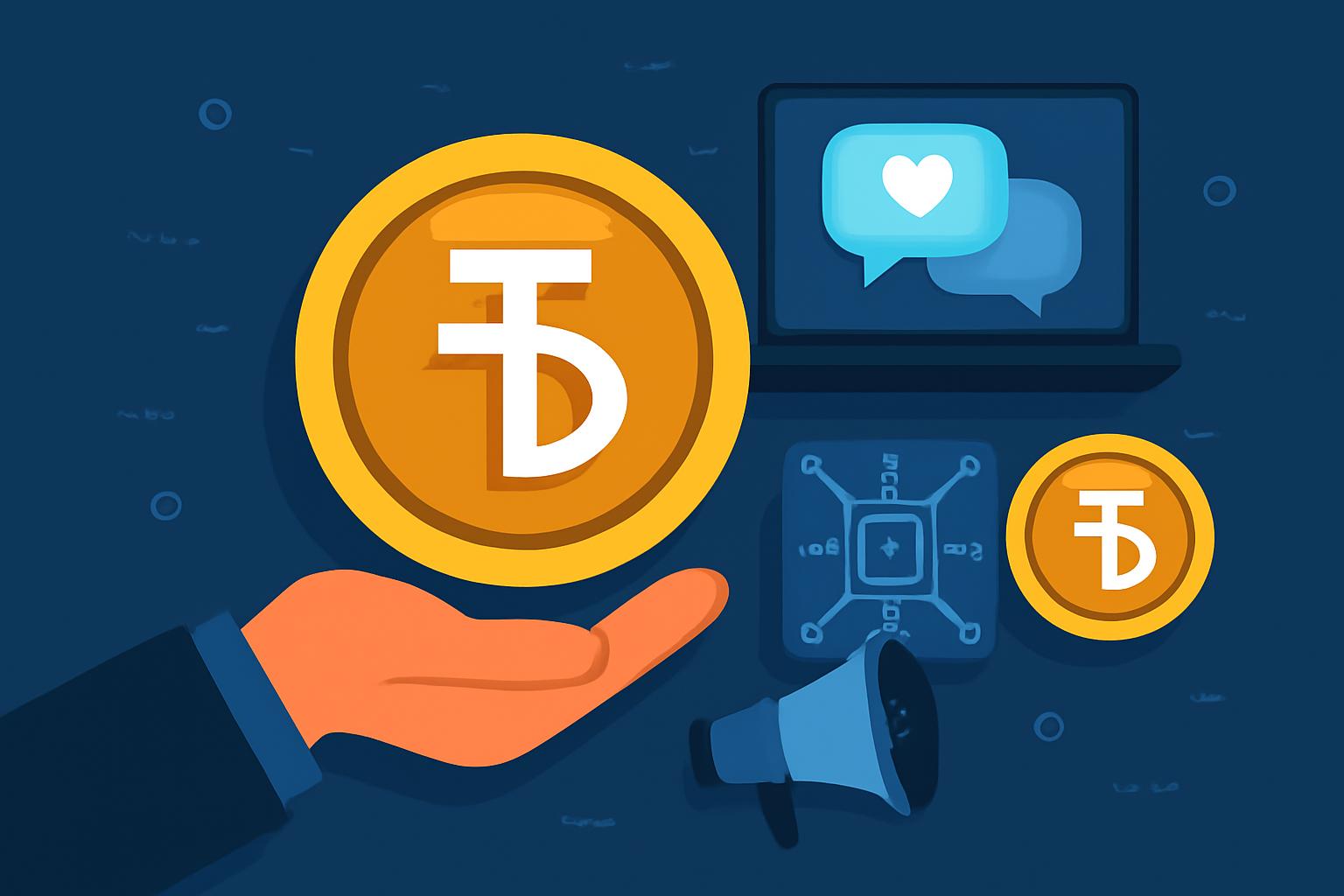Why Your Business Needs a Custom Token for Growth and Community Engagement?

Strong 8k brings an ultra-HD IPTV experience to your living room and your pocket.
In recent years, blockchain technology and cryptocurrencies have rapidly transitioned from niche concepts to mainstream phenomena, reshaping how businesses interact with customers, partners, and communities. Among the myriad innovations blockchain offers, custom tokens—unique digital assets created on blockchain platforms—have emerged as powerful tools that businesses can leverage for growth, innovation, and fostering deep community engagement.
This article explores why custom tokens have become indispensable for businesses aiming to scale and build loyal, vibrant communities. We will examine the strategic advantages of tokenization, practical applications, real-world examples, and the future outlook of custom tokens in the corporate landscape.
Understanding Custom Tokens: A Brief Overview
A custom token is a blockchain-based digital asset created according to a specific standard, such as Ethereum’s ERC-20 or Binance Smart Chain’s BEP-20. These tokens represent various forms of value and utility that businesses can tailor to suit unique objectives—be it customer rewards, governance rights, access to exclusive services, or digital collectibles.
Unlike cryptocurrencies like Bitcoin or Ethereum, which serve primarily as decentralized money or store of value, custom tokens are programmable assets designed to function within specific ecosystems. They offer businesses unprecedented flexibility in designing economic models and engagement strategies.
The Business Case for Custom Tokens
Businesses today face fierce competition in acquiring and retaining customers. Traditional marketing approaches are often expensive and fail to generate meaningful long-term engagement. Custom tokens offer a novel way to differentiate, incentivize, and build lasting relationships.
1. Enhancing Customer Loyalty and Retention
Tokens enable reward mechanisms that are more transparent, flexible, and engaging than traditional loyalty points. Unlike conventional systems tied to a single company, blockchain tokens can be:
- Traded or sold on secondary markets, giving customers real monetary value.
- Interoperable across partner platforms, increasing utility.
- Programmed with smart contracts to automate rewards based on behavior or milestones.
For example, Starbucks experimented with blockchain-based loyalty rewards, offering customers tokens redeemable for free coffee, merchandise, or exclusive experiences. This approach boosted repeat purchases and customer lifetime value by making rewards more exciting and tradable.
2. Building and Empowering Communities
Custom tokens facilitate community governance by granting token holders voting rights on product decisions, roadmap priorities, or marketing initiatives. This participatory model cultivates a sense of ownership and alignment between the business and its customers.
The DeFi sector (Decentralized Finance) offers many examples where governance tokens enable holders to decide on protocol changes, fee structures, or new features. This level of engagement builds trust and transforms customers into advocates.
3. Unlocking New Revenue Streams
Tokenization can create innovative monetization models. Businesses can:
- Issue tokens as part of Initial Coin Offerings (ICOs) or Security Token Offerings (STOs) to raise capital.
- Sell tokens granting access to premium services or content.
- Enable token staking programs where customers lock tokens to earn rewards, encouraging long-term holding and reducing churn.
Gaming companies such as Axie Infinity use tokens as in-game currency, traded among players for real-world value, generating new revenue while engaging the player base.
Strategic Advantages of Custom Tokens for Business Growth
Let’s delve deeper into how custom tokens offer concrete strategic advantages:
1. Increased Transparency and Trust
Blockchain’s immutable ledger means all token transactions are public and verifiable. This transparency enhances trust in loyalty programs and community governance, addressing concerns about data misuse or unfair manipulation.
When companies issue tokens tied to rewards or ownership, customers can independently verify token distribution and usage, making the engagement more authentic.
2. Global Reach and Inclusion
Tokens exist on decentralized blockchain networks, enabling businesses to connect with a global audience without geographical or currency barriers. This can be crucial for brands targeting international markets or digital-first demographics.
Moreover, tokens allow unbanked or underbanked users to participate in the economy via digital wallets, broadening the customer base and fostering financial inclusion.
3. Programmability and Automation
Smart contracts automate token functions like issuance, transfer, redemption, and burning, reducing administrative overhead and human error. Automation ensures timely and consistent reward delivery, improving customer satisfaction.
For instance, decentralized applications (dApps) automate dividend payments to token holders, streamlining investor relations.
4. Data-Driven Insights
Token interactions generate rich data on customer behavior, preferences, and network effects. Businesses can analyze token flows to fine-tune marketing campaigns, product development, and engagement strategies, fostering data-driven growth.
Practical Use Cases of Custom Tokens in Business
The versatility of custom tokens allows businesses across industries to implement tailored solutions. Below are prominent use cases:
1. Loyalty and Rewards Programs
- Example: Singapore Airlines’ KrisPay token rewards frequent flyers with digital miles that can be redeemed with partner merchants.
- Tokens increase engagement by allowing miles to be traded or pooled among family members.
2. Access and Membership Tokens
- Example: Decentraland uses NFTs and custom tokens to grant users access to virtual land and experiences.
- Businesses can create exclusive clubs or VIP memberships accessible only to token holders.
3. Crowdfunding and Capital Raising
- Example: Blockchain startup Polkadot raised over $145 million through its DOT token sale.
- Tokens can represent equity or utility, providing liquidity and market validation.
4. Governance and Voting Rights
- Example: MakerDAO token holders vote on stability fees and collateral types affecting the protocol.
- Governance tokens align community incentives with project success.
5. Digital Collectibles and NFTs
- Example: NBA Top Shot issues limited-edition basketball highlight NFTs.
- These tokens boost brand visibility and fan engagement while generating direct sales.
6. Supply Chain and Asset Tracking
- Example: Walmart uses blockchain tokens to track food provenance, enhancing transparency and safety.
- Tokens facilitate real-time verification and consumer confidence.
Challenges and Considerations in Implementing Custom Tokens
While promising, launching custom tokens involves challenges businesses must address:
1. Regulatory Compliance
Tokens may be classified as securities or commodities depending on jurisdiction, triggering complex legal requirements. Engaging legal experts to navigate securities laws, KYC/AML, and tax obligations is essential.
2. Technical Complexity
Developing secure smart contracts and integrating tokens into existing systems requires skilled blockchain developers. Poorly coded contracts risk exploits and financial losses.
3. Market Volatility
Tokens traded on open markets are subject to price fluctuations, which can impact perceived value and customer sentiment.
4. User Education and Adoption
Blockchain concepts remain novel for many customers. Clear communication, intuitive wallets, and seamless onboarding are vital for adoption.
Case Studies: Businesses Successfully Leveraging Custom Tokens
Case Study 1: Brave Browser and BAT Token
Brave Browser incentivizes users with its Basic Attention Token (BAT) for viewing privacy-respecting ads. Advertisers pay in BAT, users earn BAT, and content creators receive tips. This ecosystem realigns digital advertising economics, improves user privacy, and creates a new revenue model.
- Impact: Over 50 million users, with monthly active wallets surpassing 2 million.
- BAT tokens are traded on major exchanges, increasing liquidity.
Case Study 2: Chiliz and Socios Fan Tokens
Chiliz enables sports franchises to issue fan tokens, granting holders voting power on club decisions, exclusive merchandise access, and VIP experiences. Clubs like FC Barcelona and Juventus have millions of engaged fans using these tokens.
- Impact: Fan tokens have generated millions in revenue and increased fan engagement globally.
Case Study 3: Uniswap Governance Token (UNI)
Uniswap’s governance token allows holders to participate in protocol upgrades and treasury allocation. This decentralized approach fosters community trust and rapid innovation in DeFi.
- Impact: UNI holders influence one of the largest decentralized exchanges with billions in liquidity.
The Future Outlook: Why Custom Tokens Will Become Standard for Businesses
The trajectory of blockchain adoption suggests that tokenization will become a standard business practice akin to social media or mobile apps today. Key trends supporting this include:
- Integration with Web3: Tokens are foundational to the decentralized web, enabling identity, commerce, and governance.
- Increased Interoperability: Cross-chain token bridges expand utility and market access.
- Institutional Adoption: Enterprises and governments explore tokenization for asset management and digital currencies.
- AI and Token Synergy: Smart tokens integrated with AI-driven automation enhance personalization and predictive rewards.
In such a future, businesses that adopt custom tokens early will enjoy competitive advantages through superior customer engagement, innovative revenue streams, and resilient communities.
Conclusion
Custom tokens are more than just digital assets; they represent a transformational tool for businesses seeking sustainable growth and meaningful community engagement in the digital age. By enabling new reward systems, democratizing governance, and unlocking innovative monetization, custom tokens reshape the way companies build value and connect with their audiences.
Successful token deployment requires careful strategy, technical expertise, and regulatory foresight. However, as demonstrated by leading projects across industries, the benefits far outweigh the challenges.
In 2025 and beyond, businesses ignoring the potential of custom tokens risk falling behind competitors who harness the power of blockchain to create loyal, engaged, and empowered communities.
Note: IndiBlogHub features both user-submitted and editorial content. We do not verify third-party contributions. Read our Disclaimer and Privacy Policyfor details.


